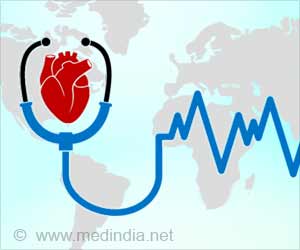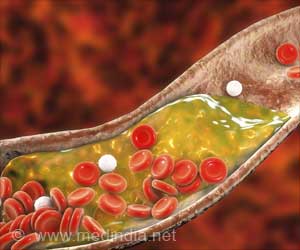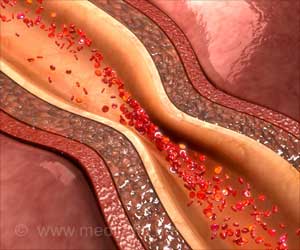The role of vascular adhesion molecules as biomarkers and therapeutic targets in preventing and treating cardiovascular diseases has been discussed in a recent research article.

The Plausible Role of Vascular Adhesion Molecules in Cardiovascular Diseases
Go to source). A new article on Plausible Role of Vascular Adhesion Molecules in cardiovascular diseases was published in the journal, Cardiovascular Innovations and Applications.
‘Did You Know?
Cardiovascular diseases (CVDs) are a group of disorders of the heart and blood vessels. Some of these include coronary heart disease, peripheral arterial disease, congenital heart disease, deep vein thrombosis, and pulmonary embolism. #cardiovasculardiseases #biomarker #medindia’





Cardiovascular diseases (CVDs) are a group of disorders of the heart and blood vessels. Some of these include coronary heart disease, peripheral arterial disease, congenital heart disease, deep vein thrombosis, and pulmonary embolism. #cardiovasculardiseases #biomarker #medindia’
What are Vascular Adhesion Molecule (VAMs)
Vascular adhesion molecule (VAM) refers to a term to elaborate on various types of molecules, which are essential in facilitating the interactions between cells, and connections of cells to the extracellular matrix. These interactions are particularly significant in the contexts of inflammatory processes and the modulation of immune cell activation.The various molecules which are a part of VAMs include the Immunoglobulin Superfamily (IgSF), Intercellular Adhesion Molecules (ICAMs), Platelet Endothelial Cell Adhesion Molecule-1 (PECAM-1), commonly known as CD31, Mucosal Vascular Addressin Cell Adhesion Molecule-1 (MadCAM-1), and Selectin, E-selectin, Integrin, and Cadherin.
During the 1980s, researchers noted the significant impact of interactions among cells, as well as those between cells and the extracellular matrix, on various physiological and pathological processes. This understanding prompted extensive investigations into cell adhesion molecules. Since then, the identification of VAMs has been an evolving process characterized by significant progress in the fields of molecular biology, immunology, and cellular biology.
A Causal Role of PECAM-1 in Cardiovascular Diseases
In the latest article featured in Cardiovascular Innovations and Applications, Sun et al. made use of Mendelian randomization method of analysis to assess the causal or fundamental links of PECAM-1 in various cardiovascular diseases (CVDs).A potential decrease in the risk of myocardial infarction and coronary heart disease has been observed with high levels of PECAM-1.
Advertisement
In conclusion, VAMs play significant roles in a variety of diseases and are involved in several critical pathways.
Advertisement
- The Plausible Role of Vascular Adhesion Molecules in Cardiovascular Diseases - (https://www.scienceopen.com/hosted-document?doi=10.15212/CVIA.2024.0046)
Source-Medindia















